
Fly! is a flight simulator video game for Windows and Macintosh developed by Terminal Reality and published by Gathering of Developers.
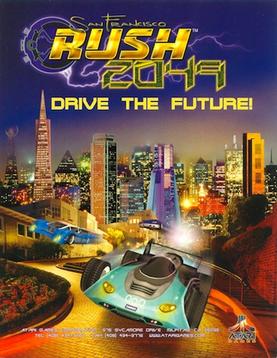
San Francisco Rush 2049 is a racing video game developed and manufactured by Atari Games for arcades. It was ported to the Nintendo 64, Game Boy Color, and Dreamcast by Midway Games West. The arcade machine was released in 1999; home versions followed in 2000 on September 7 for North America and November 17 for Europe. It is the third game in the Rush series and the sequel to San Francisco Rush: Extreme Racing and Rush 2: Extreme Racing USA. It is the last game in the Rush series to be set in the city of San Francisco and the last released on a Nintendo console. It also serves as the final game for the Atari Games label, which was retired shortly after the arcade release. The Dreamcast version was later re-released as part of Midway Arcade Treasures 3 for the PlayStation 2, Xbox, and GameCube and later for Windows as part of Midway Arcade Treasures Deluxe Edition.

Need for Speed: Porsche Unleashed, released as Need for Speed: Porsche 2000 in Europe and Need for Speed: Porsche in Latin America and Germany, is a racing video game released in 2000. It is the fifth installment in the Need for Speed series. Unlike other NFS titles, Porsche Unleashed centers on racing Porsche sports cars, with models ranging from years 1950 to 2000.

Zeus: Master of Olympus is a single-player strategy game developed by Impressions Games and published by Sierra Studios. It is considered to be an additional installment in the City Building series of games. Like previous titles in the series, Zeus focuses on the building and development of a city in ancient times. The game features a number of changes from previous titles in the series, including being set in Ancient Greece as well as changes to certain gameplay mechanics; however, it is considered to be in most aspects very similar to its predecessor, Caesar III.
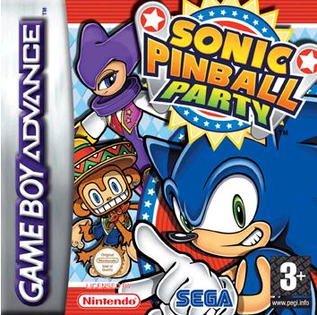
Sonic Pinball Party is a video game released for the Game Boy Advance in 2003. It is a celebration of sorts for Sonic Team featuring many references to its previous games, mostly prominently Sonic the Hedgehog, Nights into Dreams, and Samba De Amigo. There was also a release on a Twin Pack cartridge bundled with Sonic Battle and Sonic Advance respectively in 2005.

Geometry Wars is a video game made by Bizarre Creations. Initially a minigame in Project Gotham Racing 2, an updated version, titled Retro Evolved, was eventually released for the Xbox 360. That version, at one point, held the record for the most downloaded Xbox Live Arcade Game.

Frogger 2: Swampy's Revenge is an action video game developed by Blitz Games and published by Hasbro Interactive for the PlayStation, Game Boy Color, Microsoft Windows, and Dreamcast. The game is part of the Frogger series, and the sequel to the 1997 remake of Frogger, featuring similar 4-way movement gameplay in a 3D world and 6 different environments. Unlike its predecessor, Frogger 2 features a choice of different characters to play with in the game, several multiplayer modes, and an in-game storyline. A Nintendo 64 port of the game was planned, but was later cancelled.

Virtua Tennis 3, known in Japan as Sega Professional Tennis: Power Smash 3, is the second arcade game sequel to Sega's tennis game franchise, Virtua Tennis. The arcade version of Virtua Tennis 3 is powered by the PC-based Sega Lindbergh arcade system board. Ports for the PC, Xbox 360, PlayStation Portable and PlayStation 3 consoles are also available with a traditional collection of tennis minigames that the home versions of Virtua Tennis are known for. In 2009, Sega updated and re-created Virtua Tennis 3 in Virtua Tennis 2009.
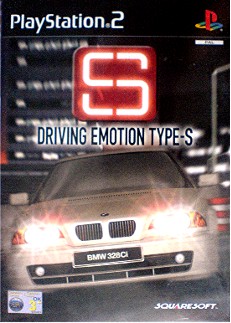
Driving Emotion Type-S is a racing game developed by Escape, a subsidiary of Square. It was published in Japan on March 30, 2000 and was Square's first release for the PlayStation 2 console. After criticisms of the game's handling, the international versions feature revised controls and additional contents, and were released in January 2001.

JoJo's Bizarre Adventure is a fighting video game developed by Capcom based on Hirohiko Araki's manga of the same title. The game was developed by the same team who was responsible for the Street Fighter III series.
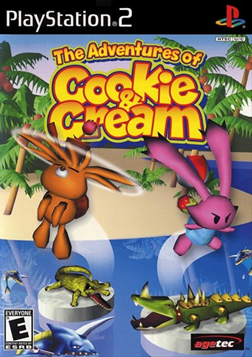
The Adventures of Cookie & Cream, known as Kuri Kuri Mix in Japan and Europe, is an action-adventure video game developed by FromSoftware for the PlayStation 2 released in 2000. In 2007, it was ported to the Nintendo DS as Cookie & Cream.

Monsters, Inc. Scream Team is a 2001 platform game developed by Artificial Mind and Movement and published by Sony Computer Entertainment for the PlayStation and PlayStation 2 and Disney Interactive for Microsoft Windows. The game is based on the 2001 film Monsters, Inc.. In 2011, the game was made available on the PlayStation Store.
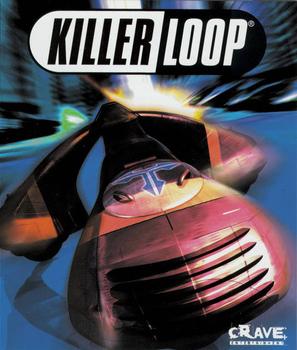
Killer Loop is a futuristic racing game released in 1999-2000. It was developed by VCC Entertainment and published by Crave Entertainment.

Pure Pinball is a series of pinball simulation video games developed and published by Legendo Entertainment The single-player games feature several themed pinball tables, each with different mechanics and game modes. The game engines mimic the physics of real pinball machines. The player can choose from several different camera angles to follow the gameplay.

America is a real-time strategy game developed by Related Designs and published by Data Becker, released in December 2000 and January 2001 to mixed reviews. Set in a post-civil war America, the game plays similarly to Age of Empires. The player may choose to control a group of either settlers, Native Americans, Mexicans or outlaws of that time.

Plants vs. Zombies is a 2009 tower defense video game developed and published by PopCap Games. First released for Windows and Mac OS X, the game has since been ported to consoles, handhelds, and mobile devices. The player takes the role of a homeowner amid a zombie apocalypse. As a horde of zombies approaches along several parallel lanes, the player must defend their home by putting down plants, which fire projectiles at the zombies or otherwise detrimentally affect them. The player collects a currency called sun to buy plants. If a zombie happens to make it to the house on any lane, the player loses the level.

Zeno Clash 2 is a first-person action role-playing and beat 'em up video game developed by ACE Team as the follow-up to 2009's Zeno Clash. It was published by Atlus for Microsoft Windows, PlayStation 3, and Xbox 360 in 2013. The game is a direct sequel and features the same characters and setting as the first. It continues the story of Ghat, Rimat, and Father-Mother.

Foul Play is a 2013 brawler action-adventure developed by UK-based indie studio Mediatonic and published by Devolver Digital. It was released for Microsoft Windows and Xbox 360 on 18 September 2013 and for Mac OS X and Linux on 28 October 2013. After a port to PlayStation 4 and PlayStation Vita was announced in mid-2014, the PlayStation 4 received its early version of the game on 1 September 2015 in North America as part of the PlayStation Heroes charity campaign, while both the PlayStation 4 and PlayStation Vita versions were actually released on 23 February 2016.

Pro Pinball: Fantastic Journey is an action video game developed by Cunning Developments, published by Empire Interactive and distributed by Take-Two Interactive for Microsoft Windows and PlayStation. It is the fourth game in the Pro Pinball series. Elements of the game include combinations of Victorian era settings, steam powered machinery, steampunk style nautical adventures, and fictional islands.

Psychotoxic is a 2004 first-person shooter video game for Microsoft Windows developed by NuClearVision Entertainment and published by Vidis and Whiptail Interactive.





















